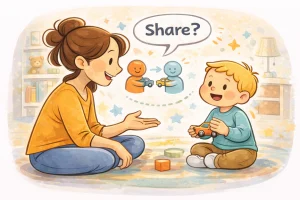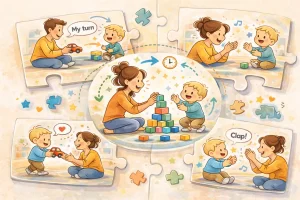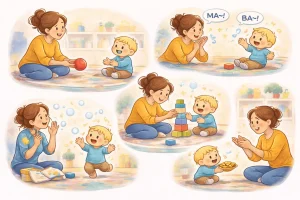Should I Be Concerned If My Toddler Substitutes Sounds?
By Rajini D
Last Updated: July 10, 2025
Is your toddler saying “tat” instead of “cat” or “wabbit” instead of “rabbit”? You’re not alone—and you’re not wrong to wonder if it matters. Many parents notice their toddler substitutes speech sounds and aren’t sure if it’s just a phase or something that needs support.
The good news? Some sound swaps are part of normal speech development. But in some cases, they could signal a toddler speech delay. In this article, we’ll explain what sound substitution means, what’s typical, when to seek help, and how you can support your child at home.
What Does It Mean When a Toddler Substitutes Sounds?
If your toddler says “tat” instead of “cat” or “wabbit” instead of “rabbit,” you might wonder what’s going on. This is called sound substitution, and it’s a common part of early speech development.
When a toddler substitutes sounds, they are replacing one speech sound with another. This often happens because some sounds are harder to say than others—especially for little mouths still learning how to move and coordinate properly. For example, the “k” sound in “cat” might come out as a “t,” or “r” in “rabbit” might turn into a “w.”
These kinds of speech sound errors in toddlers are part of something called phonological processes. These are patterns that many children go through as they learn to talk. Most of the time, these patterns go away on their own by a certain age. It’s completely normal for a 2-year-old to mispronounce words or mix up tricky sounds.
However, there are some substitutions that are more unusual or that continue beyond the typical age range. For instance, if your 4-year-old still says “tat” instead of “cat,” it might be time to check in with a speech therapist.
Every child develops differently, but it’s important to notice what sounds your child substitutes and whether it’s improving over time. Paying attention now can make a big difference later.
Is It Normal for Toddlers to Mix Up Sounds?
Yes, it’s completely normal for toddlers to mix up speech sounds as they learn to talk. Just like learning to walk or feed themselves, speaking clearly takes time—and plenty of practice. During early speech development, many children go through predictable stages. They often replace harder sounds with easier ones. For example, your child might say “gog” instead of “dog” or “wuv” instead of “love.” These mix-ups are part of typical speech development milestones, especially between ages 1.5 to 4 years.
Some of the most commonly affected sounds include:
- R, L, S, TH, SH – These take more time to master
- Consonant blends like “sp,” “tr,” or “bl”
- Back-of-the-mouth sounds like “k” and “g”
These sound swaps are known as phonological processes, and most children outgrow them naturally. That said, every child is different. What’s important is watching how their speech improves over time. If your toddler keeps saying the same incorrect sounds with no change past age 3 or 4, it may be worth looking into.
When Should I Worry About My Toddler’s Sound Substitution?
It’s normal for toddlers to substitute sounds while they’re learning to speak—but how do you know when it’s more than just a phase?
Here are a few red flags that might mean it’s time to take a closer look:
- Your child is 3 or older and still makes many sound mistakes
- You notice little to no improvement in their speech over several months
- You often can’t understand what they’re saying, even though you know them well
- Other people (like grandparents, teachers, or babysitters) regularly ask you to “translate”
- They skip or change most sounds in longer words
If these signs sound familiar, your child might be showing signs of a toddler speech delay or a phonological disorder. While some mix-ups are typical, speech that stays unclear beyond a certain age might need support.
In some cases, hearing issues can also affect how your toddler learns sounds. If your child had frequent ear infections or didn’t react well to sounds as a baby, a hearing check can be helpful. Sometimes, sound substitution might be linked to broader neurological differences, especially if paired with delays in other areas like motor skills or social interaction.
How to Help If Your Toddler Is Replacing Sounds
If your toddler is swapping sounds like “w” for “r” or “t” for “k,” don’t worry—there’s a lot you can do at home to gently support their speech.
Here are some simple and effective ways to help your toddler with speech sound substitution:
1. Repeat Words Back the Right Way
When your child says “tat” instead of “cat,” try responding with the correct word gently:
“Yes, that’s a cat! Look at the cat!”
This helps them hear the correct sound without feeling corrected. Over time, they start noticing the difference on their own.
2. Use Play-Based Speech Activities
Speech learning doesn’t have to feel like homework. Use games, storybooks, puppets, or favorite toys to introduce sounds.
- Make animal sounds together
- Play guessing games (“What starts with ‘k’?”)
- Practice sounds during pretend play
These playful moments are a fun way to boost toddler speech at home without pressure.
3. Talk During Daily Routines
Everyday tasks like getting dressed, eating, or taking a bath are great chances for language learning.
Say things like:
“Let’s get your coat. Zip the coat. Your red coat is warm!”
Repeating words with target sounds helps your toddler learn through repetition and context.
4. Sing Songs with Repeating Sounds
Nursery rhymes and action songs are excellent for practicing rhythm and sound patterns. Try “Old MacDonald,” “Wheels on the Bus,” or even simple made-up songs that use the sounds your child is working on.
5. Be Patient and Celebrate Small Wins
Your child is learning a lot at once. Even small improvements in toddler pronunciation are worth celebrating! Cheer them on when they try new words, even if they don’t say them perfectly.
When to Consider Speech Therapy for Sound Substitution
Sometimes, speech sound mix-ups in toddlers improve with time. But in other cases, speech therapy can make a big difference—especially when the substitutions continue past a certain age or affect how well your child is understood.
So, how do you know when to take that next step?
Signs Your Toddler Might Benefit from Speech Therapy
If you notice any of the following, it may be time to explore toddler speech therapy:
| Concern | What It Might Mean |
|---|---|
| Still making the same sound errors after age 3.5 | Delay in phonological development |
| Difficult to understand, even for close family | Reduced speech intelligibility |
| Not trying to correct themselves over time | Needs help with sound awareness |
| Avoids speaking in front of others | May feel frustrated or self-conscious |
| Errors are not reducing over months | May need structured guidance |
Why Early Speech Support Matters
The earlier your child gets help, the easier it is to build strong communication skills. Children’s brains are especially ready to learn during the toddler and preschool years. Starting early speech support can help your child:
- Speak more clearly and confidently
- Communicate better with others
- Avoid frustration and behavior issues related to being misunderstood
- Build strong language skills for school success
How Wellness Hub Can Help
At Wellness Hub, our experienced and friendly speech therapists understand how to make therapy fun, engaging, and effective. We start with a simple assessment to figure out what kind of help your child needs for speech sound errors, and create a personalized plan that fits your family’s needs.
Why Choose Wellness Hub for Your Child’s Speech Support?
If you’re feeling unsure about your child’s speech progress, you’re not alone—and support is closer than you think. Wellness Hub is here to make that journey smoother, simpler, and stress-free.
We offer expert-led speech therapy that’s designed specifically for toddlers and young children. Whether your child needs help with sound substitutions, speech clarity, or is showing signs of a speech delay, our friendly therapists are ready to help.
Online and In-Person Therapy Options
Every family is different, so we’ve made it easy to choose what works best for you:
- Online speech therapy you can access from home
- In-person sessions in select locations
- Flexible timing that fits your schedule
Parent-Friendly, Flexible, and Goal-Oriented
We understand how busy parenting can be. That’s why our platform is:
- Easy to use
- Mobile-friendly
- Designed to involve you in the process
- Built around your child’s unique goals
We keep parents in the loop every step of the way, with progress tracking, feedback, and fun at-home practice ideas.
Conclusion
If your toddler is replacing sounds in words, don’t panic—but don’t ignore it either. Some sound mix-ups are normal, but others may need extra support. Trust your instincts. You know your child best. Early help can make a big difference in speech development. The good news? You don’t have to figure it out alone. At Wellness Hub, we offer expert-led speech development support for toddlers. You can book a free consultation to talk with our friendly therapists. Start early, stay confident, and help your child speak clearly—one word at a time.
Frequently Asked Questions:
1. Is it normal for toddlers to substitute sounds in words?
Yes, it’s very common for toddlers to replace one sound with another as they learn to speak. This is called sound substitution and it happens because some sounds are harder to say than others. Most kids grow out of this on their own as their speech develops. So in many cases, it’s perfectly normal and not a reason to worry right away.
2. When should I worry about my toddler’s speech mistakes?
If your child is around 3.5 to 4 years old and is still making the same sound mistakes with no sign of improvement, it may be time to talk to a speech therapist. Also, if people outside the family can’t understand your child, or your child gets frustrated trying to speak, these are signs of a possible toddler speech delay that may need support.
3. Why does my toddler say “wabbit” instead of “rabbit”?
Your child is using a simpler sound (“w”) in place of a harder one (“r”). This is a type of phonological process, which is part of normal speech development. Many children go through this stage when they are 2 to 3 years old. Most outgrow it naturally, but if it continues beyond age 4, a speech evaluation can help.
4. What age should toddlers stop switching sounds?
Children often grow out of sound substitutions by age 4 to 5. Some tricky sounds like “r,” “th,” or “s” may take a little longer. But if your child still replaces many sounds or is hard to understand after age 3.5, it’s a good idea to speak with a professional.
5. Can sound errors mean my child has a speech delay?
Sometimes, yes. If your child has many speech sound errors that don’t improve over time, or if they’re not saying enough words for their age, this may be a sign of a speech delay or a phonological disorder. Early support through toddler speech therapy can help your child catch up more easily.
6. How can I help my toddler speak more clearly at home?
You can:
- Repeat the words they say with the correct pronunciation
- Use play-based speech activities like puzzles, picture books, or songs
- Talk often during daily routines (e.g., “Let’s wash your hands. Hands are clean!”)
- Celebrate when they try new words
These tips can gently boost your toddler’s speech at home and make learning fun.
7. Does my child need speech therapy for sound substitution?
If your child is over 3 and still making many sound mistakes, speech therapy may help them speak more clearly. Therapy is especially helpful if their speech affects their confidence or how others understand them. A therapist will assess if the errors are part of normal development or if your child needs guided support.
8. What causes toddlers to mispronounce words?
Toddlers might mispronounce words because:
- Some sounds are harder to learn
- They’re still developing mouth muscles for speech
- They may have had frequent ear infections or hearing issues
- They’re learning two languages (in bilingual homes)
All of these can lead to speech sound errors, and many improve naturally with time and practice.
9. Should I correct my toddler when they say a sound wrong?
Instead of saying “No, that’s wrong,” it’s better to model the right word gently. For example, if your child says “tat,” you can reply, “Yes, that’s a cat! The cat is soft.” This shows them the right way without making them feel bad or pressured. Over time, they will start to hear the difference.
10. Where can I get help for my toddler’s speech development?
You can reach out to Wellness Hub for expert speech development support tailored to your child’s age and needs. We offer online and in-person therapy sessions, flexible scheduling, and a caring team that makes therapy fun for toddlers. You can even book a free consultation to get started and see what kind of help your child may benefit from.
About the Author:
Rajini Darugupally
M.Sc., Speech-Language Pathologist (9+ years of experience)
Rajini is a passionate and dedicated Speech-Language Pathologist with over 9+ years of experience, specializing in both developmental speech and language disorders in children and rehabilitation in adults. Driven by a desire to empower each individual to find their voice, Rajini brings a wealth of experience and a warm, genuine approach to therapy. Currently, at Wellness Hub, she thrives in a team environment that values innovation, compassion, and achieving results for their clients.
Book your Free Consultation Today
Parent/Caregiver Info:
Client’s Details:
* Error Message









